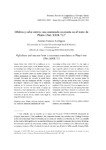Mostrar o rexistro simple do ítem
Ofidios y calor estivo: una enmienda necesaria en el texto de Plinio (Nat. XXIX 71)
| dc.contributor.author | Ferraces-Rodríguez, Arsenio | |
| dc.date.accessioned | 2020-01-08T16:49:06Z | |
| dc.date.available | 2020-01-08T16:49:06Z | |
| dc.date.issued | 2019 | |
| dc.identifier.citation | Ferraces Rodríguez, Arsenio 2019: «Ofidios y calor estivo: una enmienda necesaria en el texto de Plinio (Nat. XXIX 71)», Emerita 87 (2), pp. 305-316. | es_ES |
| dc.identifier.issn | 0013-6662 | |
| dc.identifier.uri | http://hdl.handle.net/2183/24572 | |
| dc.description.abstract | [Resumen] Según Plinio (Nat. XXIX 71) la culebra no es venenosa, pero puede llegar a serlo durante un período de tiempo por influjo de la luna (neque anguis uenenatus est nisi per mensem luna instigatus). La lectura per mensem carece de sentido porque los ofidios permanecen en letargo durante la época invernal. Por tanto, per mensem no puede hacer referencia a un mes cualquiera del año. Un pasaje de Gargilio Marcial y un testigo de la tradición indirecta de la Naturalis Historia apoyan la corrección per messem. De este modo, el pasaje en discusión se hace transparente y la doctrina de Plinio concuerda con la realidad: la culebra se vuelve venenosa en época estival, cuando tiene lugar la siega de la mies (messis). | es_ES |
| dc.description.abstract | [Abstract] According to Pliny (Nat. XXIX 71), the snake is not a poisonous animal, but could become one during a specific period of time by influence of the moon (neque anguis uenenatus est nisi per mensem luna instigatus). The reading per mensem makes no sense because the ophidians remain in lethargy during winter. Therefore, per mensem cannot be referring to just any month of the year. A passage by Gargilius Martialis and a witness of the indirect tradition of the Naturalis Historia support the correction per messem. This way, the passage becomes transparent and Pliny’s doctrine is consistent with reality: snakes become poisonous in summertime, at the time of harvest (messis). | es_ES |
| dc.description.sponsorship | Ministerio de Ciencia, Innovación y Universidades; FFI2013-45690-P | es_ES |
| dc.language.iso | spa | es_ES |
| dc.publisher | Instituto de Lenguas y Culturas del Mediterráneo y Oriente Próximo | es_ES |
| dc.relation.uri | https://doi.org/10.3989/emerita.2019.14.1904 | es_ES |
| dc.rights | Creative Commons Reconocimiento 4.0 Internacional (CC BY 4.0). | es_ES |
| dc.rights.uri | http://creativecommons.org/licenses/by/3.0/es/ | * |
| dc.subject | Plinio | es_ES |
| dc.subject | Historia natural | es_ES |
| dc.subject | Serpientes | es_ES |
| dc.subject | Tradición indirecta | es_ES |
| dc.subject | Enmienda del texto | es_ES |
| dc.subject | Pliny | es_ES |
| dc.subject | Natural history | es_ES |
| dc.subject | Snakes | es_ES |
| dc.subject | Indirect tradition | es_ES |
| dc.subject | Text emendation | es_ES |
| dc.title | Ofidios y calor estivo: una enmienda necesaria en el texto de Plinio (Nat. XXIX 71) | es_ES |
| dc.title.alternative | Ophidians and summer heat: a necessary emendation in Pliny’s text (Nat. XXIX 71) | es_ES |
| dc.type | info:eu-repo/semantics/article | es_ES |
| dc.rights.access | info:eu-repo/semantics/openAccess | es_ES |
| UDC.journalTitle | Emerita | es_ES |
| UDC.volume | 87 | es_ES |
| UDC.issue | 2 | es_ES |
| UDC.startPage | 305 | es_ES |
| UDC.endPage | 316 | es_ES |
Ficheiros no ítem
Este ítem aparece na(s) seguinte(s) colección(s)
-
II - Artigos [662]






